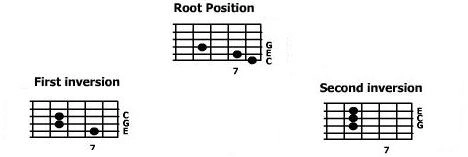The Ultimate Guide
Impress your friends with your upside down chord building skills by learning chord inversions!
This is Part 2 in my 3 part series of Chord construction
Chord inversions
When a chord's root is not the lowest pitch, the chord is said to be inverted. The name of the chord stays the same.
Why learn chord inversions
Understanding chord inversions help you choose different voicings (more ways to stack tones) of chords. Learning inversions also helps to improve your improvisation skills. Improvising (creating music on the fly) is a common thing to do in Jazz guitar but it's also great for coming up with musical ideas.
* When a chord in not inverted it is said to be in root position.
There are two types of inversions
* First inversion = the 3rd is the lowest pitch in the chord.
* Second inversion = the 5th is the lowest pitch in the chord.
Example inversions of a C Major triad:

The diagrams below show you the triads and the inversions from the 3rd through 6th strings for every scale degree of the A Major scale.
How to read the diagrams: Roman numeral columns denote the scale degree for each chord. Capitalized numerals are Major, lowercase are minor or diminished. Chords are color coded!
3rd string triad shapes



4th string triad shapes



5th string triad shapes



6th string triad shapes



Why no first or second string diagrams?
There are no first or second string diagrams because you can't play full chords in the correct order using only one or two strings. You can however, play arpeggios and you should try it!
Summary
I bet you understand chord inversions a whole lot better now...don't you think? I bet you can also see you have your work cut out for you too. Spend the time to commit these triad shapes to memory because it will work wonders for you on so many different levels especially building chords on the fly and improvisation.